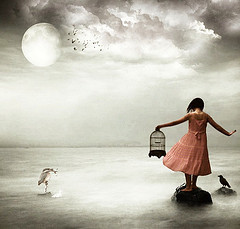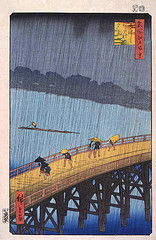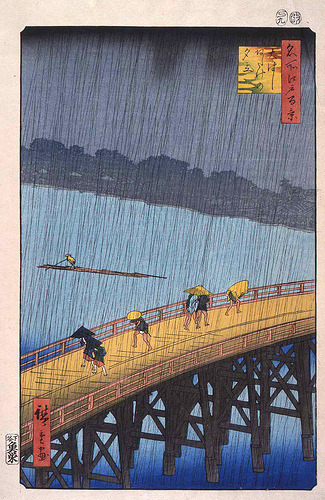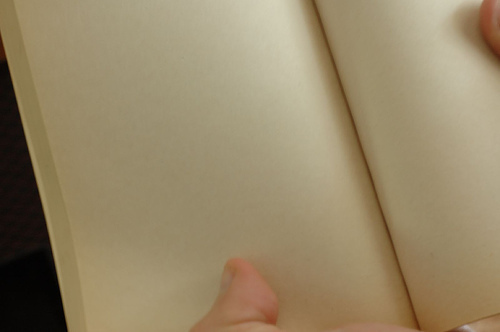Sandra Gulland's Blog, page 35
March 29, 2011
Introducing: Julianna Baggott (otherwise known as Bridget Asher) (otherwise known as … )
Julianna Baggott publishes an astonishing variety of things under an astonishing variety of names: novels, poetry, essays, blogs. It's no accident that her website—Baggot • Asher • Bode —gives the impression of a group endeavor. Plus she has a very active family. I've been reading her absolutely charming blog for some time; it has become one of my favourites. The one thing you can count on from anything from Baggot, Asher or Bode is wit and heartfelt charm.
Today is the launch day of Julianna's latest novel, The Province Cure for the Brokenhearted:
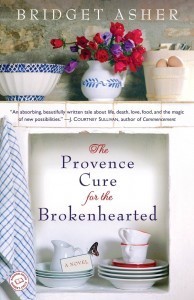
I ordered it on Kindle and it just this minute arrived on my iPad. I know from its perfect first sentence that I'm going to love it:
Here is one way to say it: Grief is a love story told backward.
Plus: it's set in France. Need I say more?
Lest you remain unconvinced, here are a few advance reviews:
"Fans of Under the Tuscan Sun will adore this impossibly romantic read."— People Magazine
"Readers who enjoy … Lolly Winston's Good Grief and Jane Green's The Beach House or travel-induced transformation books like Frances Mayes's Under the Tuscan Sun and Elizabeth Gilbert's Eat, Pray, Love will find common themes … and become quickly invested in the lives of the deftly drawn characters."— Library Journal
"Unabashedly romantic … a real charmer about a Provencal house that casts spells over the lovelorn." — Kirkus Reviews
So now for something about the author:
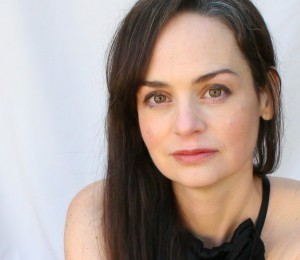
Julianna Baggott is the author of seventeen books [did you catch that? seventeen], most recently THE PROVENCE CURE FOR THE BROKENHEARTED under her pen name Bridget Asher, as well as THE PRETEND WIFE and MY HUSBAND'S SWEETHEARTS. She's the bestselling author of GIRL TALK and, as N.E. Bode, THE ANYBODIES TRILOGY for younger readers.
Her essays have appeared widely in such publications as The New York Times Modern Love column, Washington Post, NPR.org, and Real Simple.
Her blog is a mix of writerly subjects, home life accounts (I particularly enjoy these) and author interviews. The author interviews are called "The 1/2 Dozen" because she gives authors a list of questions and asks them to pick 1/2 dozen to answer.
Julianne's questions are delightfully quirky (as you will soon see), and so, for this launch day interview, I thought it appropriate to give her back her own list of questions.
And so:
A 1/2 Dozen for Julianna Baggott:
What's your advice to someone who's fallen in love with a writer?
If you're charmed by neuroses, double down. If you see poverty as an adventure, go for it. A writer's upsides tend to be: witty banter, imagination, insights, close observation. I would make sure you're completely compelled to love this writer if the dark sides show up: biting snark, self-centric imagination, doomed global thinking, scrutiny. It helps if you both think you're funny. It helps if the other brings out your best self.
What's your advice to a writer who's looking for a lifelong partner? Any particularly useful traits to suggest in said partner? (Do you want to tell us a brief love story here?)
Make sure they truly get obsession; preferably from the inside out. If you are their obsession, this might not work out so well, as you'll be absent a lot and, when you return, you'll be tired and thirsty and hungry. It's better, I think, if you both show up at the end of a long day tired and thirsty and hungry, and ready to take turns leaning and boosting.
What kind of child were you, inside of what kind of childhood, and how did it shape you as a writer?
I was supposedly sickly, except that I wasn't. I was just raised by a hypochondriac. I was really small and very underweight and wiry and tough, though I cried easily, that type. I was raised among older siblings and adults mostly, in a family that told a lot of stories. My parents took me to a lot of plays. I had a large vocabulary and oversized eyes and a very skinny neck. I hated the nickname Puppet. All of this applies to my work.
Some writers hate to write. Other writers love being engaged in the creative process. How would you describe your relationship with the page?
It's a wild relationship. As volatile as it gets, I think we knew we'll always get back together. Without it, I'd be heartbroken. I'm compulsive about the page, obsessive in my imaginative dwelling. I wouldn't know what to do without writing. It's the disease and the cure.
Criticism. It's part of the territory. How do you handle it? Is this the way you've always handled it?
In early stages of a novel, I can't hear much of it. If I look for the fault lines too early, they'll be all I see. But then at 50 pages, I need someone to weigh in, imaginatively. Sometimes it's a relief to hear, "Nope, not working. Pull up the stakes." Then, after a first draft, I want as many critics as I can get — in the ideal range for the audience. I want it all. Heaps of it. After I'm finished and it's been edited madly and it's in book form, I'm not interested in hearing what I should have done differently. It's like watching people drown and you can't save them, and someone's there, telling you that you could have avoided the lake altogether. Where were you then? I want to say. Too late, too late.
Are you bloggish?
I am bloggish. Sandra, here, has turned the tables and sicked my own questions on me. So, yes, I have writers and agents answer questions. I blog about my own weird, loud, rambunctious household. I blog about bookish things, pop-culture, and distinctly un-bookish things. It's like the caverns of my pocketbook — be careful. You could find ANYthing in there and wander off lost… Here's the dangerous link: http://bridgetasher.blogspot.com/
Thank you so much, Julianna! And to readers of this blog: Julianna's warning is well heeded. It's hard to dip into her world without wanting to stay for a very long time.
You can visit her blog at http://bridgetasher.blogspot.com/ and her website at www.juliannabaggott.com.
Have you read one of her books or her blog? Are you likewise addicted?
March 28, 2011
And the title is … (we're not yet sure)
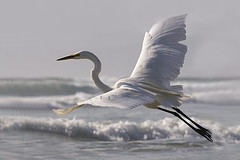
Whew! The 3rd draft was "sent" this morning to my agent. (Four days before I promised it: yay!) I won't hear back for three weeks, so I'll postpone my fretting for a week or so.
I've been promising a word about the title, which is presently, ta da…
(Drum roll please.)
Keeper of the Secrets
It's hard to know if it will stick. I hope so.
When I put titles up for feedback in my last newsletter, here's what I heard back:
1. Keeper of the Secrets was indeed the run-away favourite. I personally like Keeper of the Secrets quite a bit because it ties in with both the worlds of the theatre and court. In the world of the theatre, "Keeper of the Secrets" is the title of the person in charge of the special effects (and who is thus also suspected of witchcraft). As the suivante to Madame de Montespan, my heroine becomes the go-between between Athénaïs and Madame Voisin, the sorcerer, and thus becomes keeper of real secrets. She gives birth to a daughter by the King; and that, too, becomes a secret.
A possible problem with Keeper of the Secrets is that there may be too many books published with similar titles.
2. The Arts of Fascination came in 2nd: nobody disliked it, but few chose it as their #1 favourite.
3. The Travesty Player got similar reaction, but with some negativity.
4. A number of people liked the title The Beginning of Magic, but quite a few did not. My daughter's boyfriend suggested The Origin of Magic, which rather intrigued me—it's an excellent title—but the novel is not enough about magic.
And so: what do you think?
March 27, 2011
Guilty: sakful, saked, culpable, plightful …
I love the embellishment stage of writing a novel, that point at which the story is more or less (for the time being) gelling. Early on, the focus is on structure: parts, chapters, scenes. The cast; their characteristics. As the novel evolves, the focus is closer in: on the dialogue, the paragraphs, the sentences, the words.
At this stage, I work with the on-line Oxford English Dictionary: oh, the glory of it!
Yesterday, I checked the word emotion and discovered that it's a fairly modern word. I should not have been surprised.
This morning (it's not even 8:00 am as I write this) (I shouldn't be writing a blog, but getting on with The Revision) I checked the word guilty. Ah, it's an ancient word, with a delicious pallet of colours:
sakful
saked
culpable
plightful (I love this, and the variant plighty)
criminous
nocent
faultful (another good one)
blood-guilty (we're getting into serious guilt, here)
obnoxious and noxious
guiltful (I do love all these "ful" words)
This last is the one I will use, at least for the time being. I hope to send this draft (#3) to my agent tomorrow. And so, guiltful for blogging, I return to my task.
(I know, I promised a post on titles…tomorrow: after I've sent IT off?)
Question: What ancient word do you love?
March 23, 2011
My day: a day
[image error]Good Reads. In the glow of glimpsing the light at the end of this particular tunnel, I expressed serious interest in this offer. The due date is far into the future, the authors participating are admirable, and the project itself (literacy!) is one dear to my heart.
And so, with all that, to lunch. Next up: the title debate.
March 20, 2011
Reader letter of the week

I get the most wonderful mail. Here's one:
I hope this email finds you well. My name is Kristin and just this past week, I have just finished reading your Josephine B. trilogy. I read all three books within a week and wanted to let you know of the impact your writing has made on me.
You see, I am planning a celebratory trip to Paris this fall with my mother. Paris has always been a city that has intrigued me, mostly for the tragic and romantic notions that surround it. Over the past several months, I have been conducting research on the places that we would like to visit. It is very easy to become overwhelmed, due to the city's rich history that contains so much allure, stories, and sights. I honestly didn't know where to begin. Once I did begin, I became lost very quickly in choices, guidebooks, travel websites, reviews, etc.
A friend, after hearing of my travel plans, recommended your books. The timing could not have been more perfect. As I was reading your books, I found myself keeping my laptop right by my side. I have probably used Google and Wikipedia more in the past week than I have in the past year. Without realizing it, I have given myself a "mini-education" on various aspects of the French Revolution and of course, Josephine and Napoleon. My next order of business is to read as much as possible on that time period, using many of your recommendations (from your website).
Our trip in the fall now has a better sense of purpose, as we will plan to visit many of the sites from the novels. I am particularly drawn to Malmaison, and hope to spend some time there during our visit. I plan on giving the first book in the series to my mother this weekend, I'm sure she will be just as charmed as I was.
I just wanted to express my thanks for your wonderful work. I am very much looking forward to buying your other books. I should probably save one for the airplane ride but I know that the temptation to read it right away will be too great!
Kristin and her mother will be celebrating two milestone birthdays together: she will be turning 30, and her mother 60. I can't imagine a lovelier celebration.
Be sure to try to see David's The Coronation of Napoleon in the Louvre, Kristin: the room it's in is not open for viewing every day, so you have to find out when to go. It's well worth it. I wept when I last saw it.
Enjoy Malmaison! And thank you so much for writing.
Readers: what places have you traveled to after reading about it in a book?
March 17, 2011
Woes, and cures for woes
.
I've been feeling challenged this week: deadline approaching plus website problems. If only I could ignore it, but I can't: I love it too much. Plus: it's important.
In short: my site was moved to WordPress, which I love, in part because of all the great plugins. But then WordPress upgraded, but the plugins did not (sorry for this boring talk!): in short, the site collapsed. A move to a new server, an almost successful restore, and I'm sort of back on track. I must re-post quite a few posts to this blogs (and pray that the wonderful comments come with them). I don't want to think of the hours and hours of time wasted.
I'm having a hard time discipling myself. This always happens, I notice, after I've sent off work to The Task Master. I fall into a despond. I should be working on Part II of The Next Novel, I know; I should be gathering together receipts for taxes; I should be …
And etc.
So what do I do instead? I start a FaceBook "honour roll" of readers who have read my books more than once. It was a whim, but I adore it. Check it out: http://on.fb.me/ReaderHonourRoll
Readers rock!
Okay, now I'm going to get at those taxes.
{image credit}
March 16, 2011
My Japan; My Chernobyl
.
I had a hard time sleeping last night, worrying about my son who was due to fly to Korea on business this coming weekend. I'd been sending him information on iodine tables, the prospects of radiation exposure in Seoul, the latest dire news out of Japan. Needless to say, I was relieved to learn this morning that the trip was postponed (for other reasons entirely).
It reminded me, vividly, of the day of the Chernobyl melt-down. There were fears of a radioactive cloud coming over Ottawa, near our home. I was in Toronto, on business; my children were back home, in the path of this cloud. I panicked, but there was nothing I could do!
(Ironically, I noticed what I thought was a travel movie on Brazil playing at a theatre near where I was staying. I'd spent my early years in Brazil, so I thought it might help sooth my shattered nerves. Well! As anyone who has seen the movie Brazil knows: it was anything but calming, especially under the circumstances.)
I have a special relationship with Japan, and I feel what it is going though deeply. I travelled there twice in my teens. The country enchanted me; I wanted to stay there forever. I read their novels, their poets, learned tea ceremony, the art of flower arrangement. I suspect that a Japanese sensibility—that spare beauty—has infused my sense of ideal prose. My brother and his wife import Japanese antique furniture: they travel there often and know that country well. All our family houses are graced with beautiful Japanese antique tonsus and prints.
And so what does this have to do with The Writing Life? It has to do with how Life goes on, under a cloud. I sent off my "last bit" to The Task Master this morning. (Yay!) I'm going to pay a little attention to all that other stuff that needs attention: income taxes (ugh), a mountain of correspondence (sigh), before dealing with the revision of Parts I, II, III. My website is a disaster: you might have noticed. This needs attention, as well. But for now, all I really must think of is April 1: the day The Next Novel gets sent to my agent, complete with a beginning, a middle, and an end.
A miracle.
Do you remember the day of the Chernobyl meltdown? Where were you? What were you doing?
My Japan; My Chernobyl is a post from: Sandra Gulland's blog.
My Japan; My Chernoble
I had a hard time sleeping last night, worrying about my son who was due to fly to Korea on business this coming weekend. I'd been sending him information on iodine tables, the prospects of radiation exposure in Seoul, the latest dire news out of Japan. Needless to say, I was relieved to learn this morning that the trip was postponed (for other reasons entirely).
It reminded me, vividly, of the day of the Chernoble melt-down. There were fears of a radioactive cloud coming over Ottawa, near our home. I was in Toronto, on business; my children were back home, in the path of this cloud. I panicked, but there was nothing I could do!
(Ironically, I noticed what I thought was a travel movie on Brazil playing at a theatre near where I was staying. I'd spent my early years in Brazil, so I thought it might be soothing. Well! As anyone who has seen the movie Brazil knows: it was anything but calming, especially under the circumstances.)
I have a special relationship with Japan, and I feel what it is going though deeply. I travelled there twice in my teens. The country enchanted me; I wanted to stay there forever. I read their novels, their poets, learned tea ceremony, the art of flower arrangement. My brother and his wife import Japanese antique furniture: they travel there often and know that country well. Our houses are graced with beautiful Japanese antique tonsus and prints.
And so what does this have to do with The Writing Life? It has to do with how Life goes on. I sent off my "last bit" to The Task Master this morning. (Yay!) I'm going to pay a little attention to all that other stuff that needs attention: income taxes (ugh), a mountain of correspondence (sigh), before dealing with the revision of Parts I, II, III. Deadline: April 1!
{image}
March 13, 2011
Priming the pump with old similes

One of my favourite diversions, when stalled on writing, is to search Google Books for examples of the use of similes. I set the search—", like a"—for books in full view, published between 1600 and 1800.
This is a bit like priming the pump, but I find, in this way, as well, that I learn quite a bit about the period: how rural it generally is, for example, and how thundering the preachers were.
Here's one charming example:
To know how to Divide one's Life, like a Man of Tarts.
Many of the images have to do with moon- and starlight; in our well-lit world, we are not as aware of it:
like a gleam of light, amidst the dark verdure of the forest…
like a burning star falling
the moon came out of the sea like a spectre wan and vapoury
Images from the natural world are prominent:
like a woodcock caught in his own springe
like a little mole in the dark
I found him under a tree, like a dropp'd acorn.
stared like a stuck pig
its hair bristling like a hog
like a hare shot in form
like a rapacious vulture
like a beast of prey that tramples and howls
vex'd like a morning eagle
Did I know that eagles were vexed in the morning?
A number call up images of ghosts, spirits and the devil:
glides like a ghost
sneered like a devil
like a demon thing, or shadow hovering
passed from before her eyes like a phantom
I loved this:
that low sweet voice, like a widow's moan
And this one is a puzzle:
That marriage is just like a Devonshire lane.
Any suggestions?
Priming the pump with old similes is a post from: Sandra Gulland's blog.
March 12, 2011
The delicious temptation of research
This morning I received the following note from Jordan Gentile, a reader of this blog. I'd just had a fruitful few hours writing, but at least half of that time was, in fact, rummaging around the Net, searching for the perfect, telling detail. (More on my delicious findings in another post.) All fiction—and especially historical fiction, I suspect—is a symbiotic push-and-pull between research and creation. Jordan expresses this dynamic well. (Thank you, Jordan!)
Sandra,
I was just watching a C-SPAN "Booknotes" segment on YouTube (are Canadians familiar with C-SPAN?) in which all of the panelists were nonfiction writers of various sorts — journalists, historians, memoirists, etc. In spite of their not being novelists, they ALL agreed, to a person, that research is the most enjoyable aspect of their work, and that writing is the hardest.
I used to have a regular newspaper job myself, and, despite being known as a good wordsmith, I completely agree with both you, Sandra, and the C-SPAN panelists: It was always a cinch to pick up the phone and talk to sources, gather quotes, take notes, research stuff online, etc., but a pain in the butt to finally stare at a blank computer screen and start producing sentences.
Sometimes I think the extra thoroughness I put into my interviews was just procrastination, so that the writing part of my job could be forstalled for another half-hour or so!
Another problem, of course, is that writing often produces more questions about your subject than you had during the "official" research phase of the project. The great American historian David McCullough ("Truman," "John Adams") addresses this problem rather ingeniously by actually starting to write his books very shortly into the research process, in spite of his relative ignorance at that stage, knowing that all of his best and most insightful questions, not to mention the ones most germane to his narrative, will come to him only after he begins creating said narrative.
Anyway, the point is, the majority of writers can relate to what you're
going through!
Best,
Jordan
[Sidenote: Jordan wrote to me directly because he was unable to post his note in "Comments." Is anyone else having this difficulty? If so, email me: sgulland AT sandragulland.com. I've just converted this site to WordPress, and I'm still working out the bug.]
The delicious temptation of research is a post from: Sandra Gulland's blog.


